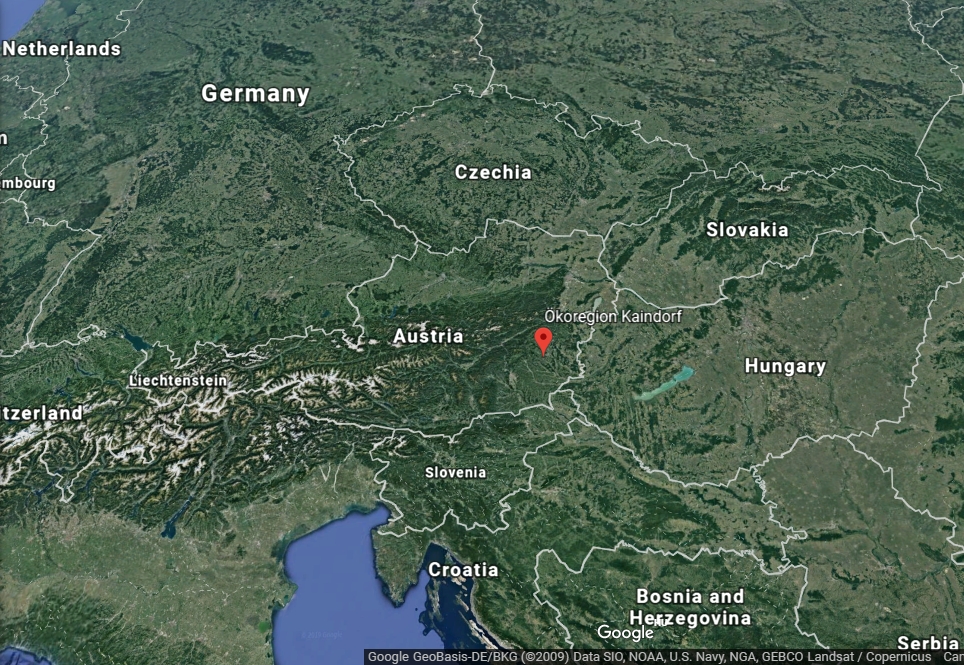Case study dilemma and research question
How to combat climate change (e.g. water scarcity), increase carbon sequestration, prevent soil degradation and reduce the loss of soil fertility of arable land, whilst maintaining or enhancing social and economic sustainability?
Key characteristics and sustainability issues of the farming system
The “Ökoregion Kaindorf” is located in Eastern Austria (federal state of Styria) where the eastern slopes of the Alps are slipping into the Southeast-Austrian lowlands and hillsides. The background of the initiative is climate change, a certain exposure to periods of water scarcity in recent years and a higher risk in the coming decades as well as declining humus content on arable land. The initiative to increase soil fertility in the region is supported by three municipalities1 covering 79 km² with 6,150 inhabitants (Ökoregion Kaindorf 2019). Most of the 316 farms in the region practice intensive arable farming (42% of the farms in the region, see INVEKOS 2013); less important farm production types are pig husbandry, fruit production and cattle fattening. 16 of the farms are organically farmed (INVEKOS 2013); 25 farms in the core region of Kaindorf participate in the “Humus Project” in 2019 (Krobath 2019).
While most activities of the Association “Ökoregion Kaindorf” take place within the region’s borders, the farmers involved in the “Humus Project” are spread across the entire north and east of Austria. There are 250 farms participating throughout Austria with 2,500 ha of arable land.
The “Humus project” of the umbrella organisation “Ökoregion Kaindorf” is focusing on the increase of soil fertility and carbon sequestration. The program includes knowledge transfer to farmers (e.g. “Humusakademie”), CO2 compensation certificates purchased mainly by regional companies, the use of compost and an initiative for biochar, reduction of soil tillage and compulsory greening of arable land, mixed cropping, etc. Experience on increasing soil fertility is exchanged in a group of regulars (“Humus-Stammtisch”). Meanwhile an international audience participates in events of the “Humus project”. An average of 10 tons of CO2 per hectare and year is sequestrated on a total of 2,500 hectares. Water storages capacities have increased significantly. The carbon sequestration-project is accompanied by several smaller agro-ecological projects, e.g. support of agro-forestry, traditional extensive grassland-orchard management systems as well as hemp production.
The network is characterized by close cooperation between farmers and a large network of partners from politics, society, consumers, education (schools), business and research. The Association “Ökoregion Kaindorf” plays a crucial role within this network. Founded in 2007, the association has grown to currently 560 members as well as 25 partner companies and employs six persons (Krobath 2019). In addition to agro-ecological farming, the “Ökoregion Kaindorf” initiative various topics: mobility, energy efficiency, heating and electricity, fair trade, tourism, housing, “Natur im Garten”, etc.
Key actors involved
- the founders of the initiative;
- key employees of the Association “Ökoregion Kaindorf”, who are engaged in agro-ecology;
- farmers representing different farm production types as well as distinct stages of the agro-ecological transition pathway;
- representatives of the Chamber of Agriculture,
- agricultural advisors and extensionists (including agricultural schools) as well as reseachers;
- the mayors of the three municipalities of the region as well as state and national politicians;
- local companies involved in the initiative (e.g. buyers of CO2 compensation certificates, food processors and retailers),
- representatives from the administration (e.g. ministry for agriculture)
- other actors engaged in the initiative “Ökoregion Kaindorf”, e.g. secondary schools.
References
- INVEKOS (Integriertes Verwaltungs- und Kontrollsystem; IACS, Integrated Administration and Control System) (2013): Database. Austrian Federal Ministry of Agriculture, Forestry, Environment and Water Management, Vienna.
- Krobath, M. (2019): Personal communication, SNA Interview May 2nd, 2019. Ökoregion Kaindorf (2019): https://www.oekoregion-kaindorf.at/ (15.05.2019).
Download
- UNISECO H2020 policy brief: Mitigation of climate change by humus formation and regenerative arable farming in Eastern Austria
- UNISECO H2020 policy brief: Eindämmung des Klimawandels durch Humusaufbau und regenerativen Ackerbau in Ostösterreich
- UNISECO H2020 issue brief: Mitigation of climate change by humus formation and regenerative arable farming in Eastern Austria
- UNISECO H2020 issue brief: Eindämmung des Klimawandels durch Humusaufbau und regenerativen Ackerbau in Ostösterreich
Related newsitems
Case study „Ökoregion Kaindorf“
